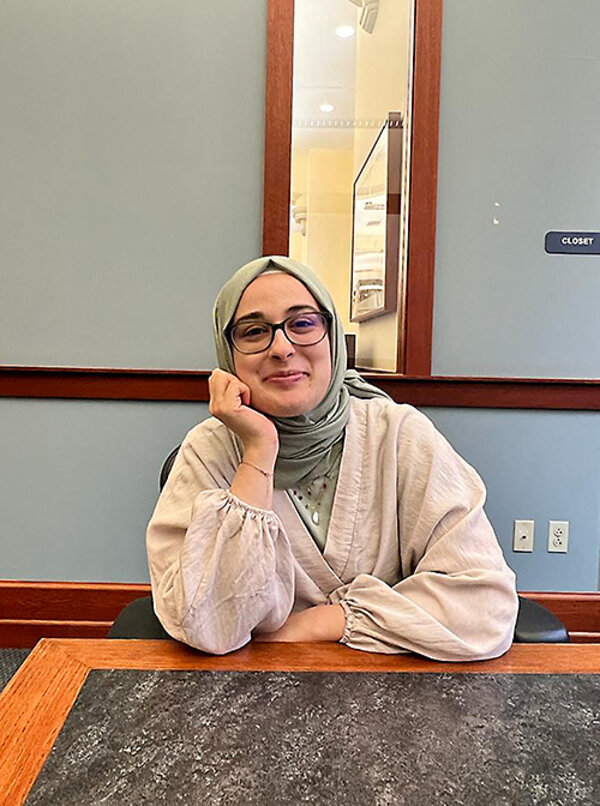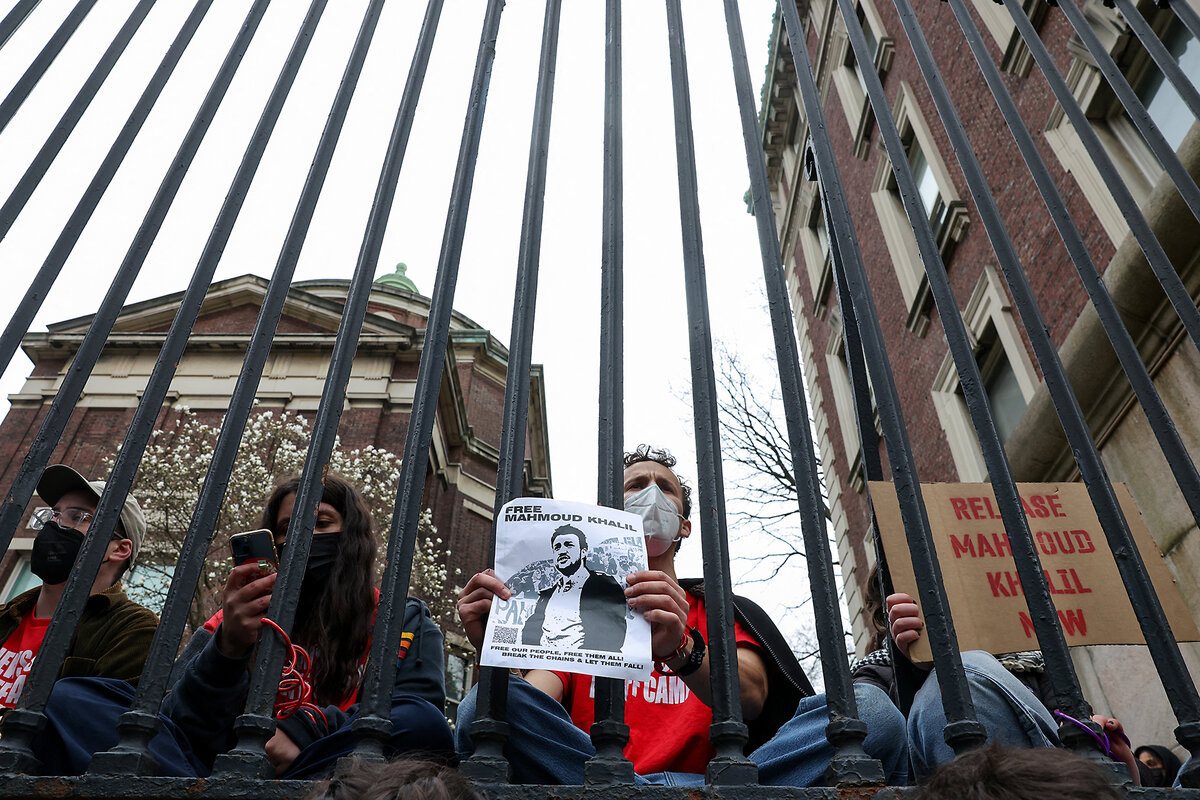They came to the US for degrees. They fear being deported without them.
Loading...
| Boston
They all have seen the video: Rümeysa Ûztürk, a Tufts University doctoral student from Turkey, being snatched from a street in Somerville, Massachusetts, by masked undercover Immigration and Customs Enforcement agents.
International students interviewed say that Ms. ├¢zt├╝rkŌĆÖs arrest has deeply unnerved them and their friends studying in the United States. Some have lost sleep. They have cried together. Many worry that they could be handcuffed next, and whisked off to jail or back to their home country without the degrees they came here for.
ŌĆ£We are in survival mode right now,ŌĆØ says a Chinese doctoral student from a Boston-area university, who spoke on condition of anonymity because he is here on a student visa.
Why We Wrote This
ŌĆ£We are in survival mode,ŌĆØ international students say of navigating a new landscape under the Trump administration. The arrest of a Tufts University doctoral student by undercover agents has had a chilling effect.
Professors and friends have told him to stay away from all protests ŌĆō including one at a Tesla dealership, which he attended ŌĆō and advised him not to travel back home. He asked for an adviserŌĆÖs cellphone number and shared it with friends, in case anything happens to him.
ŌĆ£This is [taking] a big emotional toll,ŌĆØ says the student. ŌĆ£There are a lot of fellow students around me. We cried together many times because of this situation. It was just very cruel.ŌĆØ
Several hundred students at colleges and universities in the United States have had their student visas revoked ŌĆō including at Stanford; UCLA; the University of California, Berkeley; and other California campuses. An unknown number have been detained over the past month. Trump administration authorities say the visa revocations are for foreign policy reasons, including a portion sparked by pro-Palestinian protests across campuses. So far, the revocations represent just a fraction of the more than 1 million foreign students who study in the United States annually ŌĆō most of whom pay full sticker price for an American higher education.
ŌĆ£If the United States government has national security concerns regarding a student and they feel that their visa should be revoked, they are within their rights to do that. But we are really trying to understand, in this new environment, what does that mean? What are these students doing that is triggering a national security concern?ŌĆØ says Sarah Spreitzer, assistant vice president at the American Council on Education, which advocates for 1,600 colleges and universities.
Most international college students hold F-1 visas and are allowed to enroll as full-time students. They are allowed to travel in and out of the country, and enjoy most constitutional rights. They cannot vote or receive federal financial aid or other government benefits.
International students have brought a financial boon to both universities and the overall U.S. economy. In a 2023-2024 school year , 1.1 million international students added $43.8 billion to the economy and supported 378,175 jobs, the NAFSA Association of International Educators found. That was up from $26 billion a decade ago. Ms. Spreitzer is concerned that current policies could send students and researchers looking for berths in Canada or Europe instead.
How things have changed since March 8
The new climate for international students began March 8, when Mahmoud Khalil, a Palestinian graduate student at Columbia University and a green card holder, was detained near his school. Mr. Khalil had participated in rallies and sit-ins at Columbia and did on-camera interviews in support of Palestinians. His voice was a standout during campus upheaval over the Israel-Hamas war in Gaza. He was arrested in Manhattan, transferred to New Jersey, and then flown to a facility in Louisiana, where he currently remains while his court case plays out.
Other students, including Ms. Ûztürk, are being held in the same facility.
On April 4, a judge ordered her case moved to Vermont. A Department of Homeland Security spokesperson has said that Ms. ├¢zt├╝rk engaged in activities in support of Hamas, which the U.S. government designates as a foreign terrorist organization. Specific evidence has not been released by the government. Many reports have mentioned an op-ed Ms. ├¢zt├╝rk co-authored criticizing the universityŌĆÖs response to the war in Gaza, but it is unclear whether that played a role in her detainment.
Badar Khan Suri, an Indian national postdoctoral fellow at Georgetown University, was taken into custody at his Virginia home before being transferred to Louisiana. A few international students whose visas were revoked, such as Cornell UniversityŌĆÖs Momodou Taal, have chosen to leave the country rather than risk incarceration and deportation.
At a late March press conference, U.S. Secretary of State Marco Rubio said have been revoked, though he added that the number ŌĆ£might be more, because weŌĆÖre doing them every day,ŌĆØ and was a combination of student and visitor visas.
ŌĆ£We gave you a visa to come and study and get a degree, not to become a social activist that tears up our university campuses,ŌĆØ Mr. Rubio told reporters.
The state has the power to revoke student visas, all interviewed agree, but institutions are wanting to know the new rules so that they can help students navigate.
ŌĆ£We are very concerned about the fear that this is causing for our students, but then also trying to figure out how best our institutions can advise these students,ŌĆØ says Ms. Spreitzer.
Her office doesnŌĆÖt have an official number of how many students have been affected. Schools are not being reliably informed, she says ŌĆō either about revoked visas or new initiatives such as consulates being instructed to search profiles of students applying for visas. She is bracing for additional changes, such as travel bans for international students and rule changes to the student visa program. Students arenŌĆÖt clear on how or whether they can dispute claims about social media posts that threaten national security, she says. In some cases, there isnŌĆÖt proof the student wrote messages being used against them.
ŌĆ£This is no longer a foreign-policy issue, this is no longer an issue of a war in a far-off land. This a question of what weŌĆÖve been told all our lives are American values.╠²Because those are the things being torn away right now,ŌĆØ says Hassan Kamal Wattoo, a Pakistani student at UC Berkeley School of Law who practiced law in his home country and clerked for its Supreme Court. ŌĆ£ItŌĆÖs not just about us [foreign students] anymore, because it doesnŌĆÖt stop with us. ... When you set a precedent of taking away individual freedoms from one segment of society, itŌĆÖs inevitable that this will expand to others.ŌĆØ
Mr. Wattoo says that he was born in a dictatorship and lived under military rule in which people were afraid to cross invisible lines of speech. ŌĆ£IŌĆÖve seen this film before, and America is feeling really close to home these days,ŌĆØ he says of Ms. ├¢zt├╝rkŌĆÖs and othersŌĆÖ arrests. ŌĆ£The general populace would be scared into silence. And thatŌĆÖs the same thing weŌĆÖre seeing now. Like writing an op-ed can get you arrested, deported.ŌĆØ
Is ŌĆ£defend American valuesŌĆØ controversial?
The Student Press Law Center released a statement after Ms. ├¢zt├╝rkŌĆÖs arrest, defending the tradition of debate generated by the opinion pages of student newspapers. ŌĆ£The First Amendment is an asset, not an inconvenience,ŌĆØ the statement read.
ŌĆ£IŌĆÖve read that [the Trump administration] said we canŌĆÖt have these people disrupting campuses. Well, did Tufts complain to anybody? I mean isnŌĆÖt it TuftsŌĆÖ decision to say whether R├╝meysaŌĆÖs disruptive or not? Why does the federal government come in and decide that sheŌĆÖs been disruptive?ŌĆØ asks Larry Feig, a professor of molecular and chemical biology at Tufts University School of Medicine.
Dr. Feig, who is Jewish, says he thinks deportations for people speaking out against the war is weaponizing the charge of antisemitism.
ŌĆ£I donŌĆÖt think Trump gives a [darn] about antisemitism, and I think he just used this as a tool,ŌĆØ says Dr. Feig.
Nathan Wolff, an associate professor of English at Tufts, who is also Jewish, agrees. Dr. Wolff says he believes Jewish people at Tufts have a moral responsibility to speak out and say that the actions taken by the government are not in their name and that they donŌĆÖt condone the crackdowns.
ŌĆ£Right now, the main thing that IŌĆÖm hearing is that, understandably, all international students and all students are deeply scared,ŌĆØ Dr. Wolff says. ItŌĆÖs difficult to advise students on what rights they have or if their visas are in danger, he adds.
Meanwhile, the Boston-area Ph.D. student says he and his friends communicate daily. He is worried about multiple political social media posts heŌĆÖs made that he thinks are too late to delete. He was planning to visit his parents in China, since he hasnŌĆÖt been back in five years, but professors have told him not to even visit BostonŌĆÖs Logan International Airport.
ŌĆ£I feel like now, a lot of people canŌĆÖt see hope in the future, including myself,ŌĆØ he says.
Mr. Wattoo also describes himself as disillusioned. When asked about a potential need for anonymity by a reporter, he responds, ŌĆ£All I am saying right now is to defend what weŌĆÖve been told all our lives are American values. Free speech. Due process.╠²Should that be a controversial statement in America?ŌĆØ
ŌĆ£If America has reached the point where saying ŌĆśI support the First Amendment,╠²and I do not want the people I disagree with to be arrestedŌĆÖ╠²is enough to have a very legitimate risk of me getting deported, thatŌĆÖs dystopian,ŌĆØ he continues.
When asked if thereŌĆÖs anything that gives him hope, he pauses.
ŌĆ£The people maybe. IŌĆÖve seen a lot of people who have been willing to, at great risk to themselves, speak up for what they think is right. And that has given me hope,ŌĆØ he says. ŌĆ£But I donŌĆÖt know if itŌĆÖs enough. I donŌĆÖt know if there are enough people╠²willing to speak up.ŌĆØ
A Monitor correspondent contributed to this report.









